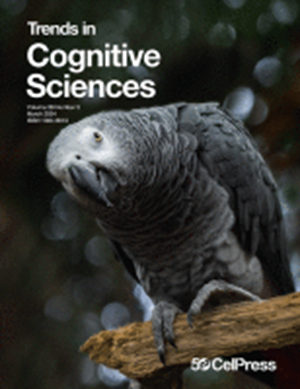为什么元认知在有政治争议的领域很重要?
IF 16.7
1区 心理学
Q1 BEHAVIORAL SCIENCES
Trends in Cognitive Sciences
Pub Date : 2024-09-01
Epub Date: 2024-07-06
DOI:10.1016/j.tics.2024.06.005
引用次数: 0
摘要
新出现的证据凸显了元认知--洞察我们自己的知识和思想的可靠性和不稳定性的能力--在具有政治争议的领域中的重要性。本综述阐明了为什么元认知在政治环境中很重要,以及元认知对个人如何形成信念、处理证据和做出决策的潜在影响。本文章由计算机程序翻译,如有差异,请以英文原文为准。
Why metacognition matters in politically contested domains.
Emerging evidence highlights the importance of metacognition - the capacity for insight into the reliability and fallibility of our own knowledge and thought - in politically contested domains. The present synthesis elucidates why metacognition matters in politically charged contexts and its potential impact on how individuals form beliefs, process evidence, and make decisions.
求助全文
通过发布文献求助,成功后即可免费获取论文全文。
去求助
来源期刊

Trends in Cognitive Sciences
医学-行为科学
CiteScore
27.90
自引率
1.50%
发文量
156
审稿时长
6-12 weeks
期刊介绍:
Essential reading for those working directly in the cognitive sciences or in related specialist areas, Trends in Cognitive Sciences provides an instant overview of current thinking for scientists, students and teachers who want to keep up with the latest developments in the cognitive sciences. The journal brings together research in psychology, artificial intelligence, linguistics, philosophy, computer science and neuroscience. Trends in Cognitive Sciences provides a platform for the interaction of these disciplines and the evolution of cognitive science as an independent field of study.
 求助内容:
求助内容: 应助结果提醒方式:
应助结果提醒方式:


